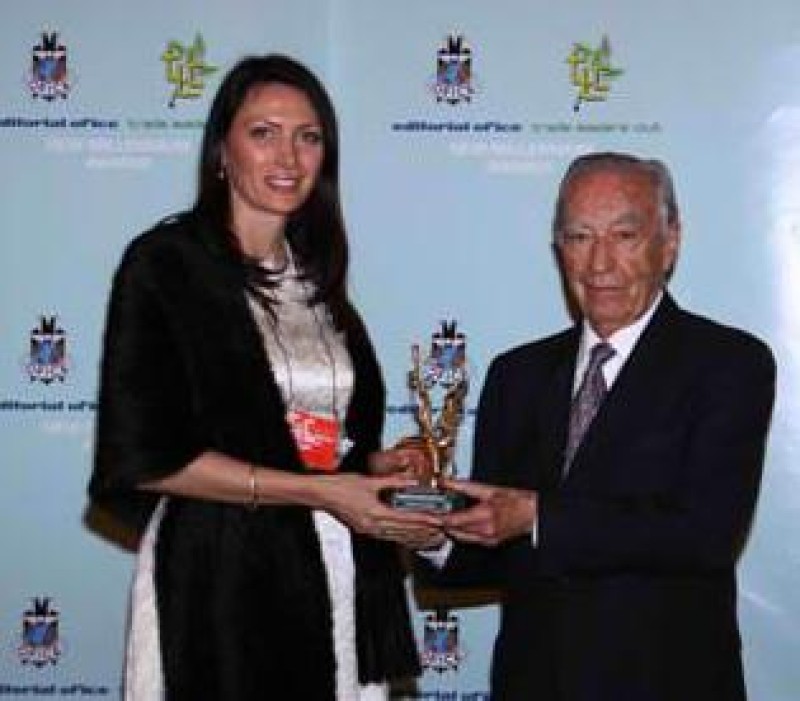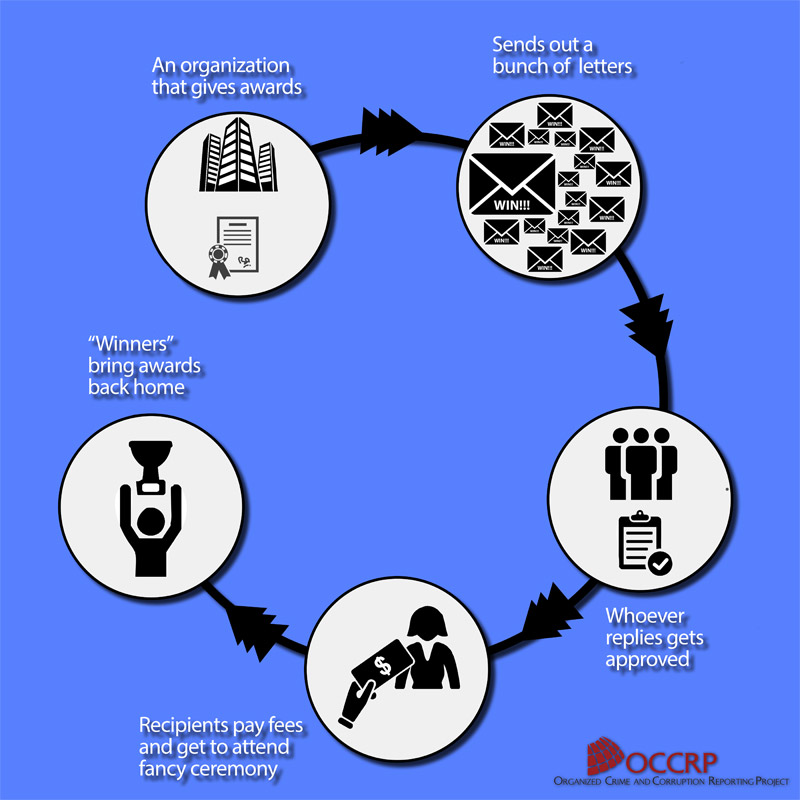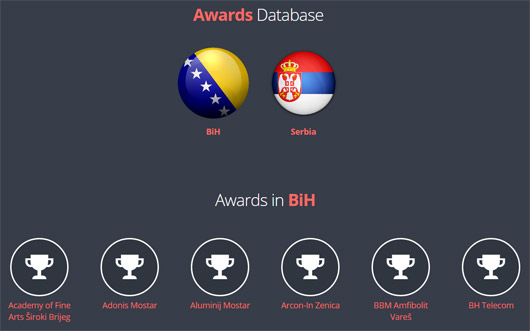The event is frozen in time, the photos emblazoned in a special section on the pharmacy website, as an important symbol of international success.
But is it?
Many institutions and individuals in the Balkans like to show off international awards as proof of a great achievement or business accomplishment. In many cases, however, those awards are bogus, sold by unscrupulous organizations that prey on human vanity.
Center for Investigative Reporting of Serbia (CINS) and the Organized Crime and Corruption Reporting Project (OCCRP) found that awards mania has swept the region since 2000, with hundreds of “honors” doled out during that period. Yet CINS/OCCRP could find no evidence of competitions, judging, or even set criteria used to determine winners.
The pattern appears to be that anyone who pays enough money can win an award. Many winners come from the public sector, which means that money paid for awards came from budgets or ultimately from the pockets of taxpayers.
These awards do not come cheap.
In Serbia and Bosnia and Herzegovina, around 50 public institutions received these awards. Some paid for multiple awards at prices that ranged from € 2,000 to more than € 7,000 (US$ 2,500-9,300) per prize.
“Quality” and “prestige” prizes have gone to Balkan companies which later went into bankruptcy or faced investigation.
For example, the Serbian state-owned pharmaceutical company Galenika was honored in 2009, but later became the subject of an investigation and prosecution. Ten people including two company directors of Galenika were indicted in January 2014 on charges of fraud and embezzlement of more than € 75 million (around US$ 95 million).
In 2005, former Sarajevo Airport director Bakir Karahasanović and assistant director Elvedin Begić (who is also president of the BiH Football Association), received an award for the airport. In July 2014, the Sarajevo Canton Prosecutor’s Office launched an investigation against them for several charges related to their work at the airport, including abuse of office and making harmful contract for the company.
'Giving' Away Awards Turns Out To Be A Highly Profitable Business
The organizations that provide these awards are nearly always based in European Union countries and mostly market their awards to developing countries, including those in the Balkans. They operate in a similar manner, and don’t publish a lot of information about themselves. Even their websites don’t reveal such basic information as their whole history or previous winners. Some of them change websites frequently or open new ones.
After reading every month that different local companies received “prestigious” international awards, CINS/OCCRP reporters examined media archives for the past 15 years, and identified six of the prize organizations most active in the Balkans.
Reporters then sought documentation on the organizations and talked with their prizewinners. They have also contacted these organizations, but only two replied.
Otherways Management Association Club (OMAC), based near Paris, France, describes itself on its website as an association which links businesses. Its membership consists of its award winners who come from more than 80 countries.
Global Trade Leaders’ Club (GTLC) is based in Madrid, Spain, and presents itself as an association of leading businesses with 7,500 members from 95 countries. It says there is no financial contribution needed and the only requirement to join GTLC is to win one of its awards.
But, while memberships are free, the awards themselves require hefty payments. Both OMAC and GTLC hold ceremonies several times a year and give awards to dozens of institutions and companies annually. Each of these organizations awarded a prize to the state-run Belgrade Pharmacy, the largest chain of pharmacy stores in Serbia with 124 pharmacies in Belgrade.
The pharmacy received a GTLC award in 2009 for which it paid more than € 5,600 (US$ 8,200). The following year, it received another award from OMAC at a ceremony in Berlin, but this time the company Berlin-Chemie Belgrade office paid the costs.
The ceremony was attended by the Serbian ambassador, Ivo Visković. Representatives of BiH and Serbian embassies often attend the ceremonies and sometimes even hand out the awards, while ministries at home send out congratulatory press releases.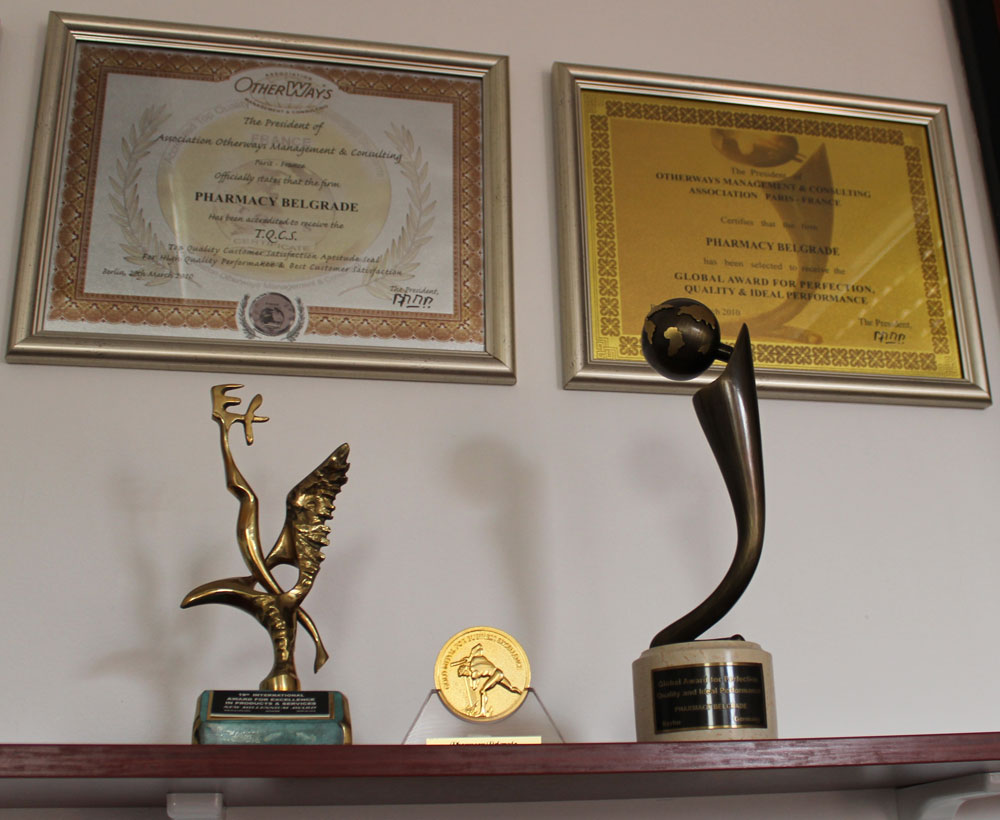 Pharmacy Belgrade awards from GTLC and OMAC in director's office
Pharmacy Belgrade awards from GTLC and OMAC in director's office
When CINS/OCCRP journalists interviewed the new director of the pharmacy, they noticed that a statuette, golden badge and plaque, received from two different organizations, are placed prominently in her office, although they were received before she took office.
Identical winners are not the only way in which GTLC and OMAC are connected.
Charbel S. Tabet founded OMAC 18 years ago and usually hands over the awards at this organization's ceremonies. However, CINS/OCCRP journalists found that in the past, through another organization he ownes – United PubliSalons International – Tabet worked as a GTLC consultant and was even named as a contact person for awardees on an invitation letter for a GTLC ceremony in March 2002.
In addition, as a director and founder of the company Foodica Best Foods, he also received a GTLC award in 1994. The company later received awards from OMAC as well, which means one of his organizations presented awards to another.
Other organizations CINS/OCCRP looked into were:
The Europe Business Assembly (EBA), Oxford, United Kingdom
The Business Initiative Directions (BID), Madrid, Spain
Actualidad Magazine, Madrid, Spain
The European Society for Quality Research (ESQR), Lausanne, Switzerland
CINS/OCCRP compiled a database that shows these six organizations sold more than 250 awards to individuals, institutions and public and private companies in Serbia and BiH since 2000.
During research, CINS/OCCRP contacted all six organizations. Four never replied, while GTLC sent information copied from its website and invited journalists to a lunch during its next ceremony in Paris.
In several emails, OMAC wrote that its criteria for choosing awardees are strict, and not just anyone who offers money will be honored. «We do not sell potatoes,“ they said. Still, they noted that organizing an event in Europe requires high expenditures and since they do not have sponsors, they are forced to take „humble participation fees“ from the awardees.
Each of the organizations gives out several awards. They all have similar names, including words such as international/golden award for prestige, quality, leadership or new millennium and diamond award.
The organizations all find new nominees in the same manner. They say they research and choose the best, but in reality in most cases they send out hundreds of email invitations and some even allow applicants to nominate themselves on organization websites.
Anyone who replies, shows interest and agrees to pay gets an award. Most of the solicitation letters contain the ceremony program (generally held in an attractive European capital), pictures of the trophies and information about costs.
For example, EBA mailed letters to half of the universities in Serbia, telling each that it was nominated for an award. Some universities told CINS/OCCRP they continued to receive these letters even after saying they were not interested.
CINS/OCCRP’s database shows that, like the common cold, these awards spread easily. Many winners received more than one; when a company received an award from one organization, it was then often solicited by other organizations offering similar awards.
For example, in Bosnia and Herzegovina, several private companies have piled up multiple awards. The Bobar company received three awards from BID while the Ortosar company in Sarajevo received BID awards seven times.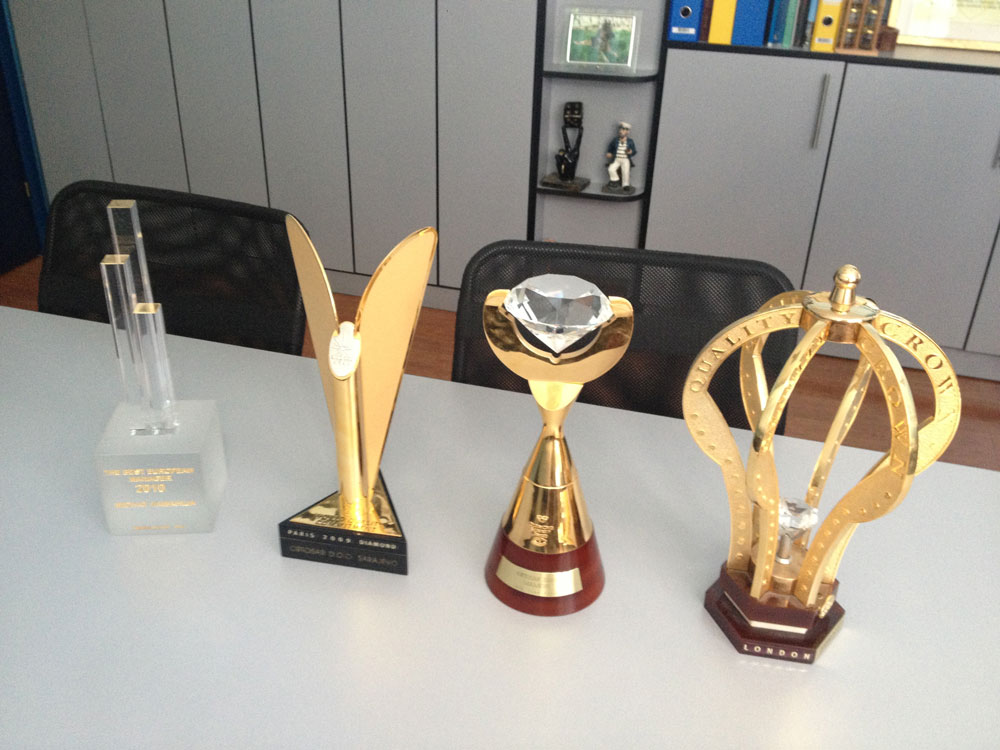 Ortosar awards
Ortosar awards
Some individuals seem especially keen on the awards. When Ibrahim Jusufranić was director of the GRAS public transport company in Sarajevo, it received an award from Actualidad in 2004; when he became owner of the private International University in Travnik, it racked up awards from EBA, OMAC and ESQR.
In Serbia, the private company Altamed has received seven awards – three from GTLC, and two each from OMAC and BID. The company Beogradske elektrane has received five awards from BID, GTLC and OMAC.
The prize organizations hold several award ceremonies a year, usually in cities such as Madrid, Berlin, London and Paris. Events last two or three days and usually contain short panels, presentation of attendees, and an awards ceremony and gala dinner. To collect the awards, winners must pay their own way to the ceremony. Several dozen winners, mostly from Africa, Asia, South America and Southeastern Europe, attend each event, paying several thousand Euros for the privilege.
Serious money is involved here.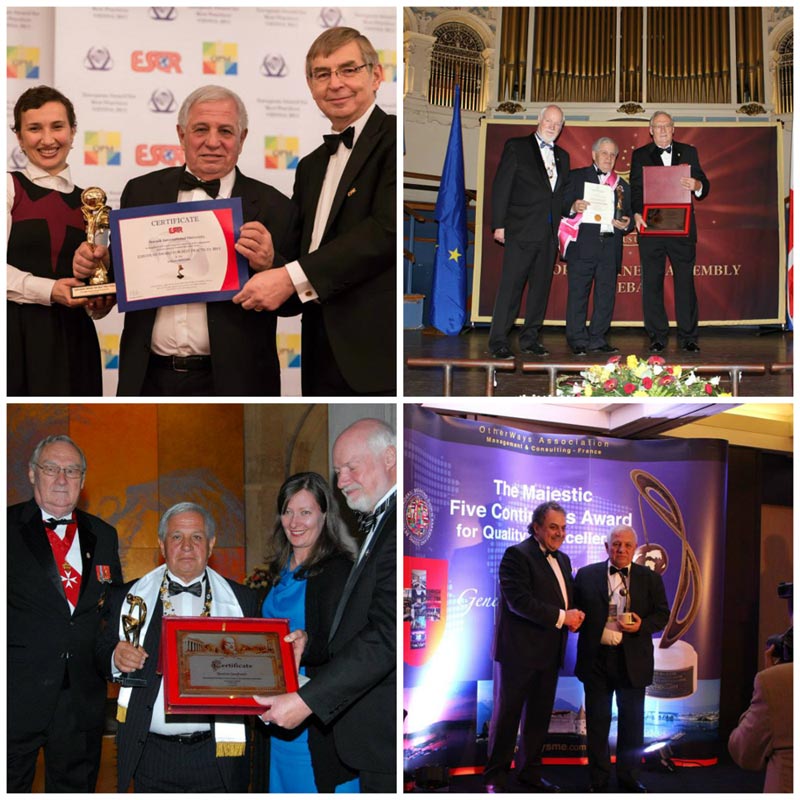 Ibrahim Jusufranic on ESQR, EBA and OMAC ceremony
Ibrahim Jusufranic on ESQR, EBA and OMAC ceremony
On its website OMAC says that in 18 years they have given out 2,635 awards – an average of 146 per year. CINS/OCCRP obtained records which show they charged € 4,200 (US$ 5,700) for a single New Era Award handed out in June 2014.
If more than 30 winners honored at that ceremony paid that price, OMAC pulled in more than € 126,000 (US$ 170,000). Usually, there are many more winners - 92 in March 2014 and 64 in November 2013 - so the income is presumably much higher.
Several winners told CINS/OCCRP that in the past, fees were lower than they are today, though the few available records from years ago show that it was a big business even then. In 2003, the BiH state Foreign Investment Promotion Agency (FIPA) paid € 3,500 (US$ 4,200) for the BID award and around € 600 (US$ 720) for travel costs. The CINS/OCCRP database indicates BID, founded in 1986, is one of the organizations that hands out the most awards.
Buying Awards With Taxpayers’ Money
Everyone loves to get a prize.
Although the awards mean nothing, winners tend to be proud of them and easy on the organizations giving them out. They don’t mind paying for travel, hotel and food for (usually) two people to attend a prize ceremony, plus registration fees and costs to cover the trophy, diploma and advertising trumpeting their success: videos, photos of the award ceremony, posters, and publications featuring profiles of winners.For winning Best Manager and Best City prizes from EBA in 2012, Belgrade paid about € 11,000 (US$ 13,400) in costs and travel expenses.
"The award is really of excellent quality, and I carry it everywhere with me,” said Tatjana Pašić, the deputy mayor who traveled to the ceremony in Ireland to take the trophy and plaque. She added she didn't know how she came to win.
CINS/OCCRP found that almost everyone who comes to a ceremony has paid to be there. Basically, when they receive a letter from the organizers, a price-list or fee required to get the award is attached.
Some organizations claim rare exceptions – for example, the Academy of Fine Arts in Siroki Brijeg, BiH, received the Actualidad statue from the Spanish ambassador in BiH in 2009. Officials said they did not pay for their prize. Still, CINS/OCCRP found others who did pay Actualidad – like the public kindergarten, Children of Sarajevo, which coughed up € 3,600 (US$ 4,600) in 2010.
While the costs are real, the ultimate value of the statuettes or plaques is questionable, especially for public institutions. Only a few of the winners who talked with CINS/OCCRP reported any kind of benefit in business terms from the awards.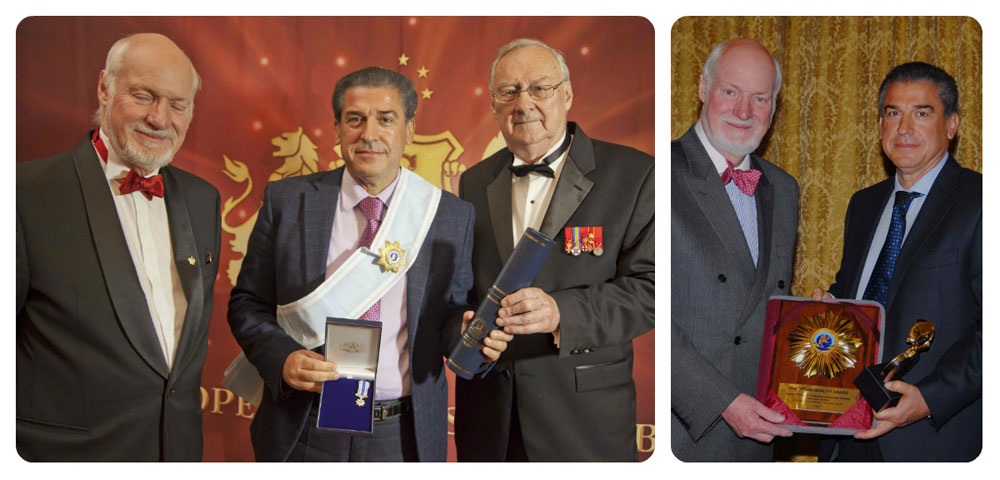 Higher School of Professional Business Studies in Novi Sad EBA awards in 2011 and 2012
Higher School of Professional Business Studies in Novi Sad EBA awards in 2011 and 2012
One entity who saw a benefit was the public Higher School of Professional Business Studies in Novi Sad, Serbia, which received several awards from EBA, their “partner” according to information on EBA’s website. School Director Dragica Tomić said in a written statement to CINS/OCCRP: “Thanks to cooperation with EBA, which was used for advertising purposes, the School managed to fulfill (its) student enrollment quotas during the past years.”
Other institutions and companies have announced awards on their websites but told CINS/OCCRP journalists they didn’t actually have a physical prize to show. Usually, they said, that was because they didn’t have enough money to cover the costs of receiving the honor.
Sarajevo Centar Municipality is proud to report on its website that it has received 23 international awards. In fact, officials traveled to one ceremony in 2003 and received three other awards by mail. As for the other 19 prizes, officials did not travel or pay the organizations that contacted them – though they still boasted of winning the prizes.
Looking at the numbers, it is not surprising they opted to stay home.
For the 2003 award that Sarajevo Center officials did pick up at the OMAC ceremony in Geneva, the municipality paid € 3,600 (US$ 3,900), plus € 1,115 (US$ 1,200) for visas, per diems and plane tickets for Ljubisa Marković, municipality mayor, and Husein Kulenović, chairman of the Municipality Council.
For the three awards that came by mail from the same organization, it paid € 6,200 (US$ 7,215) – a lower price since OMAC gave up to 40 percent discount for skipping the ceremony.
The organizations seem quite eager to cut deals, and may drop the price if initial offers are declined. OMAC offered the municipality 10 other awards between 2002-2011 (two in 2004 and three in 2008). When Mayor Marković asked OMAC how much one award would cost, OMAC’s president said US$ 3,900 but then sweetened the deal: “I offer you two more nights bed & breakfast at the Intercontinental Hotel Vienna at our own expenses, Dear Excellency & Brother Mr. Markovic.”
Winners often try to hide how much they have paid.
Two public institutions, the Institute for Mental Health in Belgrade and the Clinical Center of Serbia, would not tell CINS/OCCRP how much they paid for awards received in 2014. Still, National Bank of Serbia records reveal that the Institute paid more than € 7,000 (US$ 10,000) for EBA’s Best Regional Institute award.
In National Bank records there is no information on whether the Clinical Center paid for an ESQR award received in Brussels in June 2014, but it is noted that Belgrade Business School paid € 4,100 (US$ 5,600) to ESQR 17 days before the ceremony. Among 65 awardees from Brussels ceremony, there were two more private companies from Serbia.
Many awards organizations don’t require payments from account to account but allow winners to pay in cash when they get to the ceremony.
As opposed to public institutions and companies that buy awards using taxpayers’ money, private companies appear to take such prize fees and related costs in stride.
Vujadin Šćekić, the owner of the Serbian company Jugo-impex, did not want to say how much his company paid for an EBA award last year, but noted he has to pay even when he wants to go to lunch with a Serbian minister. His company also received an award from ESQR in Brussels.
Belgrade sociologist Jovo Bakić said that when speaking of private universities and private funds, this system of bogus rewards is just a form of marketing. And, while it might appear questionable from an ethical standpoint, it's not illegal.
“But, if taxpayer money is used,“ he said, “then that is something for law enforcement to look into.”
You Can’t Win if You Don’t Pay
Some companies, despite the seeming honor of being nominated, decline to travel, either because they do not trust the nominating organizations or do not have the required amount to spend.
For example, Serbia’s Civil Aviation Directorate received two different nomination letters from OMAC, but never accepted the awards. They said they were surprised when OMAC asked for € 4,200 (US$ 5,400) for one award.
Spokeswoman Katarina Andrić Milosavljević said they asked the organization to mail the award or to give it to Serbia’s ambassador. OMAC refused.
“If it is conditioned by anything, especially money, than it is pointless,” Milosavljević said. “Obviously this is about the mutual aid: We give you money – you give us the award.”
Participated in research: Jasna Fetahović i Maida Salkanović (CIN Sarajevo).
